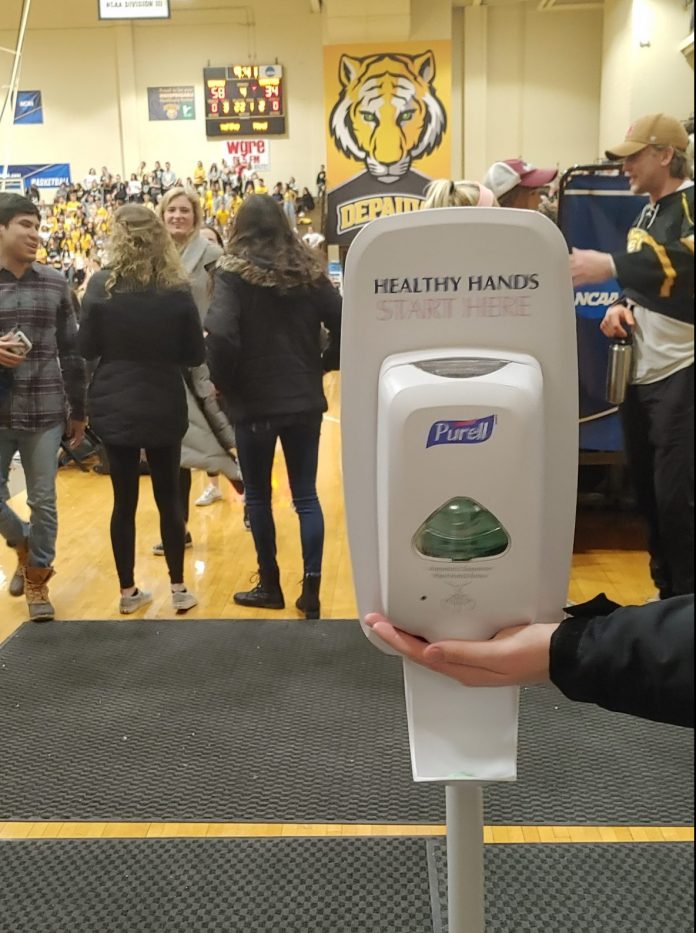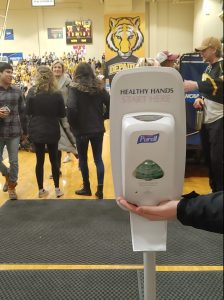
As the number of reported coronavirus cases in Indiana increases to six, DePauw, like other universities across the U.S., has taken measures to protect students, faculty and staff. Among those measures:
- DePauw has suspended in-person classes on Thursday March 19 and Friday March 20 for faculty to prepare to shift to online instruction if need be.
- A ‘no-fans’ policy was implemented on Monday that restricts sporting event attendance to players and required staff only.
- Seven DePauw students who were studying in Italy have been relocated.
- Academic events open to the public with guest lecturers or visitors are cancelled through at least spring break.

The university is taking these precautions in order to prepare for a possible outbreak on campus or in the Greencastle community.
“We recognize that the virus will come to campus, and we are preparing for that,” said Dave Berque, Interim Vice President for Academic Affairs, at a Mar. 9 faculty panel on the coronavirus.
Although there is speculation that the virus may become a local threat to DePauw’s campus, the response to the current threat should not be “panic-driven, but responsibility-driven,” Rebecca Upton, Co-Director of the Global Health Program, said.
With the possibility of the coronavirus threatening DePauw’s campus, the understanding of who is most at risk is a critical part of reacting responsibly.
“Older people and people of all ages with severe underlying health conditions — like heart disease, lung disease and diabetes, for example — seem to be at higher risk of developing serious COVID-19 illness,” Upton said.
Healthy college students are “among those least at risk for serious illness from COVID-19,” according to an email sent by CIMT on Mar. 6. However, the virus’s impact will still be felt nation-wide, as “it will affect our healthcare systems, our economy, and our way of life,” said Sharon Crary, Percy L. Julian Professor of Chemistry and Biochemistry.
An important part of containing the coronavirus is to keep track of and report your symptoms. The CDC website says that “fever, cough, and shortness of breath” are all symptoms of coronavirus, and these are similar to the symptoms of the common flu or cold.
According to an email sent out to all DePauw students, faculty and staff, if you have any coronavirus symptoms and have traveled to an area with confirmed cases of coronavirus (including any trips to Indianapolis), you should contact DePauw Health to get screened for the virus and stay home from classes.
“We want to do everything we can to protect ourselves and others who may be at higher risk in our community,” Upton said.
Although the coronavirus can be unpredictable, some students believe it is best for DePauw to delay information to ensure that information is accurate and appropriate measures are taken.
Senior Eric Boylan said, “I’d rather them [DePauw] hold off until they know, instead of telling us all this potential information and getting us worked up.
“It is really important to point out at the outset that this is a situation that is constantly evolving. Information that we have is continually updated and that is true for articles like this, too – what we would’ve said a week ago may be different from what we advise or know a week from today,” Boylan said.
Some students are less worried about their own health, as younger individuals have a lower risk of a severe reaction to the virus.
First-year Kael Valdez said, “I’m not worried for my personal wellbeing or any students on campus, I’m just concerned about the Greencastle community at large and professors, since they’re more of an elderly population.
“I think DePauw’s overreacting … and they’re not being consistent in their measures. They have good reason [to be cancelling events], but the way they’re handling academics specifically feels rushed,” Valdez said.
Other students are worried about their family members and others who may be at risk if they were to come in contact with the virus.
“I’m concerned about my grandparents who have very weak immune systems. I think [DePauw is] trying to follow CDC protocol, just like other colleges across the country. University of Oklahoma, where I’m from, just went to online classes, and they have [thousands of] students,” Sophie Jones, a first-year, said. “I think they’re trying to take every precautionary measure to ensure the safety of our students, but I don’t agree with how it’s affecting our international students. They can’t go home, and if they do they can’t come back.”
First-year Daniel Saltz thinks the media has overhyped the extent of the outbreak “to make [us] think that is a lot more lethal than it actually is. I think that it’s frustrating that the school doesn’t give us a lot of information. We are very up in the air right now because other schools have canceled but we haven’t heard much about DePauw.”
Students are also concerned about the effect any possible cancellations will have on their academics, especially classes with nontraditional formats. Anastasia-Maria Trobridge, 2023, said, “It’s up to the teachers to figure out what to do with their classes for the next four weeks, which is ridiculous. How are you going to have biology labs online?”
D’naira Wigfall, a first-year student, feels this illness more personally. “In light of the coronavirus, I feel a way I've never felt before. Whenever there was an illness that was turning into an epidemic or a pandemic it definitely didn't feel as close and as "personal" as coronavirus feels. Maybe I've never paid attention until now but it definitely feels more personal. I wouldn't say I feel scared, but I'm making sure I'm aware to keep myself safe.”
International students are also concerned about returning home, as many international flights continue to be canceled or rescheduled. First-Year Peter Phan said, “As an international student, I have to go home if I don’t have internships in the summer. But I am so concerned about the situation even two months from now. Because my hometown in Vietnam and my transit airport (Seoul) also have the virus, I’m not sure if I can get home safely.”
As the coronavirus continues to spread and scientists continue to learn more about the virus, “It is really important to point out at the outset that this is a situation that is constantly evolving,” Upton said. “Information that we have is continually updated and that is true for articles like this too – what we would’ve said a week ago may be different from what we advise or know a week from today.”
